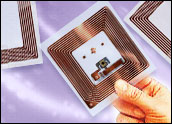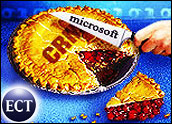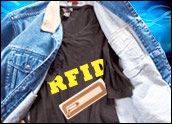
Intermec Technologies has cleared the path for retail companies to test second-generation radio-frequency identification (RFID) products and move toward wide-scale adoption, analysts said.
The company announced that it would suspend for 60 days its intellectual property (IP) licenses to stimulate RFID manufacturers to create and test systems. A next-generation standard to allow any tag to talk to any reader was approved last month by a group of retailers and consumer-goods companies, EPC Global, but royalty payments on Intermec’s 14 patents were seen as a hindrance to adoption.
Push into Mainstream
“The decision is significant because it will help drive adoption of RFID,” Mike Dominy, director of enterprise services at the Yankee Group, told CRM Buyer. “The next step for RFID is to move beyond pilot implementations of the technology into larger scale implementations.”
Other members of EPC Global whose IP was used in the standard had donated their IP to the project. Companies feared being sued for patent infringement if they built RFID tags, readers and chips using the standard without paying licensing fees to Intermec.
“The 60-day window gives other technology vendors the opportunity to submit their Gen2 products for testing,” Dominy said. “A key question is what happens after 60 days. My sense is that vendors that cannot demonstrate Gen2 products before the 60 day window will need to license IP from Intermec.”
Early Adoption Slow
Adoption of RFID technology has been slow, in part because of the lack of a standard and because the rarity of the systems makes them more expensive to implement. EPC Global will test prototypes within the 60-day period, which ends Jan. 1, to ensure that the standard works. It is aiming to ratify the standard by the end of the year.
RFID technology consists of a chip embedded in products that holds information about those products and a reader for accessing the information. Retailers such as Wal-Mart and Target have been pushing their suppliers for RFID.
Wal-Mart has set a Jan. 1 deadline for its largest 100 suppliers to have RFID systems in place to track cartons and pallets starting Jan. 1.
Target in August said it would mandate that major suppliers add RFID tagging to all cases and pallets delivered to certain distribution centers by late spring.



















































